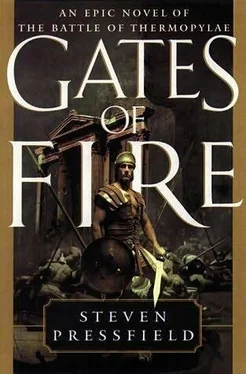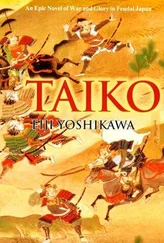Steven Pressfield - Gates of Fire - An Epic Novel of the Battle of Thermopylae
Здесь есть возможность читать онлайн «Steven Pressfield - Gates of Fire - An Epic Novel of the Battle of Thermopylae» весь текст электронной книги совершенно бесплатно (целиком полную версию без сокращений). В некоторых случаях можно слушать аудио, скачать через торрент в формате fb2 и присутствует краткое содержание. Жанр: Историческая проза, на английском языке. Описание произведения, (предисловие) а так же отзывы посетителей доступны на портале библиотеки ЛибКат.
- Название:Gates of Fire: An Epic Novel of the Battle of Thermopylae
- Автор:
- Жанр:
- Год:неизвестен
- ISBN:нет данных
- Рейтинг книги:3 / 5. Голосов: 1
-
Избранное:Добавить в избранное
- Отзывы:
-
Ваша оценка:
- 60
- 1
- 2
- 3
- 4
- 5
Gates of Fire: An Epic Novel of the Battle of Thermopylae: краткое содержание, описание и аннотация
Предлагаем к чтению аннотацию, описание, краткое содержание или предисловие (зависит от того, что написал сам автор книги «Gates of Fire: An Epic Novel of the Battle of Thermopylae»). Если вы не нашли необходимую информацию о книге — напишите в комментариях, мы постараемся отыскать её.
Gates of Fire: An Epic Novel of the Battle of Thermopylae — читать онлайн бесплатно полную книгу (весь текст) целиком
Ниже представлен текст книги, разбитый по страницам. Система сохранения места последней прочитанной страницы, позволяет с удобством читать онлайн бесплатно книгу «Gates of Fire: An Epic Novel of the Battle of Thermopylae», без необходимости каждый раз заново искать на чём Вы остановились. Поставьте закладку, и сможете в любой момент перейти на страницу, на которой закончили чтение.
Интервал:
Закладка:
The retrieval party found Ariston's body around mid-night, along the mountain wall. His squire Demades' form lay sprawled atop Ariston's with his shield still in place seeking to protect his master, both of whose shins had been shattered by the blows of a sagaris battle-axe. The shaft of an enemy lance was broken off just beneath Demades' left nipple. Although Ariston had sustained more than twenty wounds upon his own body, it was a single blow to the head, apparently delivered with some kind of mace or battle sledge, which had ultimately slain him, crushing both helmet and skull directly above the eyeline.
The tickets of the dead were customarily held and distributed by the chief battle priest, in this case Alexandras' father, the polemarch Olympieus. He himself had been killed, however, slain by a Persian arrow an hour before nightfall, just prior to the final clash with the Persian Immortals.
Olympieus had taken shelter with his men on the rampart of the Wall, in the lee of the palisade, preparatory to arming himself for the day's final siege. Of all things, he was writing in his journal. The unburned timbers of the palisade protected him, he thought; he had stripped helmet and cuirass. But the arrow, guided by some perverse fate, pierced the single opening available to it, a space no wider than a man's hand. It struck Olympieus in the cervical spine, severing the spinal cord. He died minutes later, without regaining speech or consciousness, in his son's arms.
With that, Alexandras had lost father and brother-in-law in a single afternoon.
Among the Spartans, the most grievous casualties of the first day were suffered by the Knights.
Of thirty, seventeen were either killed or incapacitated too severely to fight. Le-onidas was wounded six times but walked off the field under his own power. Astonishingly Polynikes, fighting all day in the forefront of the bloodiest action, had sustained no more than the slashes and lacerations incidental to action, a number of them doubtless inflicted by his own errant steel and that of his mates. He had, however, severely strained both hamstrings and pulled his left shoulder, simply from exertion and the excessive demands made upon the flesh in moments of supreme necessity. His squire, Akanthus, had been killed defending him, lucklessly like Olympieus, just minutes before the cessation of the day's slaughter.
The second attack had commenced at noon. These were the mountain warriors of Cissia. None among the allies even knew where the hell this place was, but wherever it was, it bred men of ungodly valor. Cissia, the allies learned later, is a country of stem and hostile highlands not far from Babylon, dense with ravines and defiles. This contingent of the enemy, far from being daunted by the cliff wall of Kallidromos, took this obstacle in stride, clambering up and along its face, rolling stones down indiscriminately upon their own troops as well as the allies. I myself could not view this struggle directly, being stationed during that interval behind the Wall, all efforts consumed with tending my master's wounds and those of our platoon and looking to their and my own necessaries. But I could hear it. It sounded like the whole mountain coming down.
At one point, from where Dienekes and Alexandros were, in the Spartan camp a hundred feet rearward of the Wall, we could see the ready platoons, in this rotation the Mantinean and the Arkadians, pouring up to the battlements of the Wall and there hurling javelins, spears and even dismantled boulders down upon the attackers, who, in the elation of the triumph they thought at hand, were keening a bloodcurdling wail which I can only replicate as Elelelelele.
The Thebans, we learned that evening, were the ones who threw back the Cissian assault. These warriors of Thebes held the right flank, as the allies saw it, alongside the sea cliffs. Their commander, Leontiades, and the picked champions fighting alongside him managed to secure a breach in the mob of the enemy, about forty feet out from the cliffs. The Thebans poured into this break and began shoving the cutoff ranks of the foe, about twenty files in breadth, toward the cliffs. Again the weight of the allied armor proved irresistible. The enemy right were rooted backward by the press of their own failing comrades. They toppled into the sea, as before in the rout of the Medes, clutching at the trousers, sword belts and finally the ankles of their fellows, pulling them over with them. The scale and celerity of the slaughter had clearly been massive, made more so by the ghastly manner in which the slain perished, that is, tumbling eighty and a hundred feet to have their bodies broken upon the rocks below or, escaping that, to drown in armor in the sea. Even from our position an eighth of a mile away and above the din of battle, we could hear plainly the cries of the falling men.
The Sacae were the next nation elected by Xerxes to assault the allies. These massed below the Narrows around midafternoon. They were plainsmen and mountain men, warriors of the eastern empire, and the bravest of all the troops the allies faced. They fought with battle-axes and inflicted, for a time, the most grisly casualties upon the Greeks. Yet in the end their own courage was their undoing. They did not break or panic; they simply came on in wave after wave, clawing over the fallen bodies of their brothers to hurl themselves as if seeking their own slaughter upon the shields and iron spearpoints of the Greeks. Against these Sacae were arrayed at first the Mycenaeans, the Corinthians and the Phliasians, with the Spartans, Tegeates and Thespians in ready reserve. These last were flung into battle almost at once, as the Mycenaeans and Corinthians spent themselves in the mill of murder and became too exhausted to continue. The reserves likewise became shattered with fatigue and themselves had to be relieved by the third rotation of Orchomenians and other Arkadians, these last having barely gotten out of the previous melee and had time to gnaw a hard biscuit and gulp down a snootful of wine.
By the time the Sacae broke, the sun was well over the mountain. The dance floor, now in full shadow, looked like a field ploughed by the oxen of hell. Not an inch remained unchurned and unriven. The rock-hard earth, sodden now with blood and piss and the unholy fluids which had spilled from the entrails of the slain and the butchered, lay churned in places to the depth of a man's calf. There is a spring sacred to Persephone, behind the sallyport adjacent to the Lakedaemonian camp, where in the morning, immediately following the repulsion of the Median assault, the Spartans and Thespians had collapsed in exhaustion and triumph. In that initial instant of salvation, however temporary all knew it must be, a flush of supreme joy had flooded over the entire allied camp. Panoplied men faced one another and slammed shields together, just for the joy of it, like boys rejoicing in the clamor of bronze upon bronze. I saw two warriors of the Arkadians standing face-to-face, pounding each other with fists upon the shoulders of their leathers, tears of joy streaming down their faces. Others whooped and danced. One warrior of the Phliasians grasped the corner of the redoubt with both hands and pounded his helmeted brow against the stone, bang bang bang, like a lunatic. Others writhed upon the ground, as horses will do sand-bathing, so overflushed with joy that they could discharge its excess in no other way.
Simultaneously a second wave of emotion coursed through the camp. This was of piety. Men embraced one another, weeping in awe before the gods. Prayers of thanksgiving were sung from fervent hearts, and none took shame to voice them. Across the expanse of the camp, one saw knots of warriors kneeling in invocation, circles of a dozen with clasped hands, knots of three and four with arms around each other's shoulders, pairs crouching knee-to-knee and everywhere individuals upon the earth in prayer.
Читать дальшеИнтервал:
Закладка:
Похожие книги на «Gates of Fire: An Epic Novel of the Battle of Thermopylae»
Представляем Вашему вниманию похожие книги на «Gates of Fire: An Epic Novel of the Battle of Thermopylae» списком для выбора. Мы отобрали схожую по названию и смыслу литературу в надежде предоставить читателям больше вариантов отыскать новые, интересные, ещё непрочитанные произведения.
Обсуждение, отзывы о книге «Gates of Fire: An Epic Novel of the Battle of Thermopylae» и просто собственные мнения читателей. Оставьте ваши комментарии, напишите, что Вы думаете о произведении, его смысле или главных героях. Укажите что конкретно понравилось, а что нет, и почему Вы так считаете.












